
Mareike Albert
TU Dresden
Germany
EMBO Workshop
Funded by EMBO for excellence in the life sciences
This conference will take place at EMBL Heidelberg, with the option to attend virtually.
The brain’s remarkable cellular diversity — encompassing hundreds of distinct neuronal and glial cell types — emerges from a single genome through sophisticated regulatory mechanisms. This EMBO Workshop brings together leaders in genomics, neuroscience, and epigenetics to advance our understanding of how the (epi)genome achieves this diversity, shaping brain function and behaviour.
Recent technological breakthroughs in single-cell, spatial, and 3D genomics and epigenomics are revealing unprecedented insights into the molecular logic behind neural diversity as well as neuronal connectivity and function. But there is much we do not understand, especially when trying to link these molecular and cellular processes to higher brain functions such as memory and behavior, or to disrupted brain states in aging and disease. Progress in these directions will require studies in human cells with traditional and emerging model organisms, all of which will be featured in this workshop.
Key questions at the cutting edge of the field will be explored, such as: how does three-dimensional chromatin architecture orchestrate cell-type-specific gene expression? What (epi)genomic processes govern the establishment and maintenance of neuronal identity and connectivity? How do activity-dependent changes in transcription and chromatin contribute to synaptic plasticity and memory? How might the dysregulation of these processes underlie neurodevelopmental and neurological disorders?
By bridging genomics, neuroscience, and epigenetics, this conference aims to stimulate new ideas on how the (epi)genome orchestrates brain function and to solidify the growing scientific community that sees the intersection of these three disciplines as fundamental to our understanding of the brain.

TU Dresden
Germany
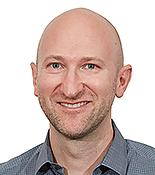
EMBL Rome
Italy

Gurdon Institute, University of Cambridge
UK

Stanford University
USA

University of California San Francisco, San Francisco
USA
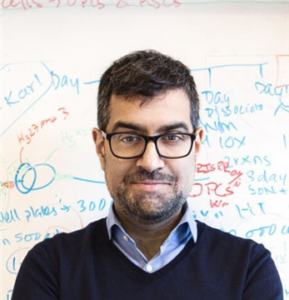
Karolinska Institute
Sweden
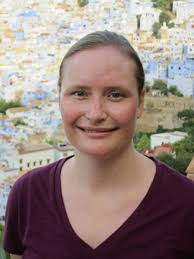
University of Colorado Boulder
USA

Salk Institute
USA

University of Lausanne
Switzerland

University of Basel
Switzerland
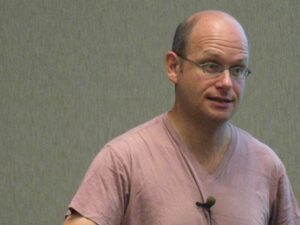
Columbia University
USA

Pohang University of Science and Technology
South Korea
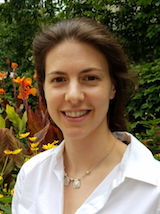
University of Pennsylvania
USA

Aarhus University
Denmark

Friedrich Miescher Institute for Biomedical Research
Switzerland

Max Planck Institute for Biology of Ageing
Germany

FAU Erlangen & Max-Planck-Zentrum für Physik und Medizin
Germany

EMBL Rome
Italy

University of Pennsylvania
USA

Aarhus University
Denmark

Max Planck Institute for Biology of Ageing
Germany

EMBL Heidelberg
Germany
Are you on social media? Post using #EMBOBrainEpi and don’t forget to tag @EMBLEvents.
| Time (Europe / Berlin) | Session |
|---|---|
| 13:00 – 14:30 | Registration |
| 14:30 – 14:45 | Opening remarks |
| 15:00 – 17:45 | Session 1: Epigenetic basis of neural diversity Chair: Erica Korb – University of Pennsylvania, USA |
| 15:00 – 15:25 | Single cell 3D multi-omics in the brain Joe Ecker – Salk Institute, USA |
| 15:25 – 15:40 | Cell-type specific network of long-range polycomb loops steers neuronal subtype identity Nikita Vaulin – Medical University of Vienna, Austria |
| 15:40 – 16:05 | Role of cell surface diversity in neural circuit assembly Daniele Canzio – University of California, San Francisco, USA |
| 16:05 – 16:20 | SZMYND8: a novel epigenetic regulator of brain development Irina Voineagu – University of New South Wales, Australia |
| 16:20 – 16:50 | Coffee Break and Meet the Speakers of the session |
| 16:50 – 17:15 | The operational principles of neuron-microglia circuits Anne Schaefer – Max Planck Institute for Biology of Ageing, Germany |
| 17:15 – 17:30 | DREAMS illuminates DNA & RNA modification landscapes and reveals novel RNA modification regulatory roles for Tet enzymes Magdalena Koziol – Chinese Institute for Brain Research, China |
| 17:30 – 17:45 | Unravelling the gene regulatory code orchestrating hippocampal selective synaptic connectivity Danie Daaboul – VIB-KU Leuven Center for Brain and Disease Research, VIB.AI Center for AI & Computational Biology, Belgium |
| 17:45 – 18:45 | Poster sneak peek |
| 18:45 – 20:15 | Dinner in Canteen |
| 20:15 – 21:45 | After dinner drinks |
| Time (Europe / Berlin) | Session |
|---|---|
| 09:00 – 11:45 | Session 2: Chromatin and neurodevelopment Chair: Alessandro Scacchetti – Perelman School of Medicine at the University of Pennsylvania, United States of America |
| 09:00 – 09:25 | Epigenetic mechanisms governing neural stem cell reactivation and differentiation Andrea Brand – Gurdon Institute, University of Cambridge, UK |
| 09:25 – 09:40 | Whole-genome single-cell multimodal history tracing reveals cell identity transition Taro Kitazawa – DANDRITE Nordic EMBL, Aarhus University, Denmark |
| 09:40 – 09:55 | Mechanisms of cell-type-specific gene regulation in sexually dimorphic neurons Margarita Brovkina – Univiersity of Michigan, United States of America |
| 09:55 – 10:25 | Coffee Break and Meet the Speakers of the session |
| 10:25 – 10:50 | Epigenetic regulation of neurodevelopment Filippo M.Rijli – Friedrich Miescher Institute for Biomedical Research, Switzerland |
| 10:50 – 11:05 | Epigenetic control of signalling pathways orchestrating glutamatergic and GABAergic network development Tanja Vogel – University of Freiburg, Germany |
| 11:05 – 11:30 | Transcription factors in neurodevelopment Oliver Hobert – Columbia University, USA |
| 11:30 – 11:45 | Epigenetic silencing and enhancer co-option balance neuronal robustness, plasticity, and evolution Nuria Flames – Instituto de Biomedicina de Valencia, Spain |
| 11:45 – 13:15 | Vegetarian Lunch and Meet the Editors |
| 13:15 – 16:05 | Session 3: Gene regulation in stress and memory Chair: Simona Capponi – German Cancer Consortium (DKTK), Germany |
| 13:15 – 13:40 | Leveraging enhancer RNAs to understand brain organization and function Tae-Kyung Kim – Pohang University of Science and Technology, South Korea |
| 13:40 – 13:55 | A single dose of cocaine rewires the 3D genome structure of midbrain dopamine neurons Dominik Szabo – Max Delbrück Center, Germany |
| 13:55 – 14:10 | Pseudouridine selects RNAs for neuronal extracellular transport Alessandro Scacchetti – Perelman School of Medicine at the University of Pennsylvania, United States of America |
| 14:10 – 14:40 | Coffee Break and Meet the Speakers of the session |
| 14:40 – 15:05 | Maintenance of memory representations through neuron-specific immune pathways Jelena Radulovic – Aarhus University, Denmark |
| 15:05 – 15:20 | Disruption of epigenetic regulators alters transcriptional programs and developmental trajectories in mouse neuronal differentiation Katrín Möller – University of Iceland, Iceland |
| 15:20 – 15:35 | The sexual dimorphism of olfactory local interneurons Ya-Hui Chou – Academia Sinice, Taiwan |
| 15:35 – 16:05 | Flash talk session 1 |
| 16:05 – 17:35 | Poster Session 1 (odd number) |
| 17:35 | Free evening |
| Time (Europe / Berlin) | Session |
|---|---|
| 09:00-11:50 | Session 4: (Epi)genomics of brain plasticity and behavior Chair: Maria Cristina Gambetta – University of Lausanne, Switzerland |
| 09:00 – 09:25 | Histone marks and variants in neuronal function Erica Korb – University of Pennsylvania, USA |
| 09:25 – 09:40 | Sex hormone regulation of neural gene expression Jessica Tollkuhn – Cold Spring Harbor Laboratory, United States of America |
| 09:40 – 09:55 | KAT3 Shuttling Between Neuronal Identity and Activity-dependent Plasticity Programs Angel Barco – Instituto de Neurociencias (CSIC-UMH), Spain |
| 09:55 – 10:25 | Coffee Break and Meet the Speakers of the session |
| 10:25 – 10:50 | Neurobiological and genetic mechanisms of social bonding Zoe Donaldson – University of Colorado Boulder, USA |
| 10:50 – 11:05 | Epigenomic signatures of addiction-like behavior in a dopaminergic self-stimulation model Lucile Marion-Poll – University of Geneva, Switzerland |
| 11:05 – 11:30 | Evolutionary expansion of the neocortex Mareike Albert – TU Dresden, Germany |
| 11:30 – 11:45 | Associative odor learning reshapes transcriptomic state space of piriform cortex Sofia Pacheco Garcia – BioTiC, France |
| 11:45 – 13:15 | Lunch |
| 13:15 – 16:00 | Session 5: Ageing and neurological disorders Chair: Daniele Canzio – University of California, San Francisco, USA |
| 13:15 – 13:40 | The transcription of a single olfactory receptor per neuron is enforced by epigenetic silencing of their enhancers Mathieu Boulard – EMBL Rome, Italy |
| 13:40 – 13:55 | Come to the light: Resolving local RNA distributions of the neuron’s dark transcriptome using subcellular Light-Seq Jennifer Heck – EMBL Heidelberg, Germany |
| 13:55 – 14:10 | Silencing of LINE-1 RNA protects against heterochromatin drift and neurodegeneration Susanna Rosi – Altos Labs, United States of America |
| 14:10 – 14:40 | Coffee Break and Meet the Speakers of the session |
| 14:40 – 15:05 | Ageing consequence on maintenance of neural identity Tomohisa Toda – DZNE Dresden, Germany |
| 15:05 – 15:20 | Non-canonical BRD4 function rescues the molecular disease signature of X-linked dystonia parkinsonism Simona Capponi – German Cancer Consortium (DKTK), Germany |
| 15:20 – 15:45 | Epigenomics of brain ageing Anne Brunet – Stanford University, USA |
| 15:45 – 16:00 | Lifespan-dependent epigenomic reprogramming in microglia links ageing to Alzheimer’s disease risk Reuben Yaa – Impreial College London, UK |
| 16:00 – 16:30 | Flash Talks Session 2 |
| 16:30 – 18:00 | Poster Session 2 (even numbers) |
| 18:00 – 19:30 | Dinner |
| 19:30 – 23:00 | Conference party with a live band |
| Time (Europe / Berlin) | Session |
|---|---|
| 09:00 – 12:00 | Session 6: Single-cell, spatial, and 3D genomics in the brain Chair: Zoe Donaldson – University of Colorado Boulder, USA |
| 09:00 – 09:25 | Long-range gene regulation in neurons Maria Cristina Gambetta – University of Lausanne, Switzerland |
| 09:25 – 09:40 | Single-cell multi-omics profiling reveals stimulus-specific innate immune memory in microglia Desirée Brösamle – Biomedical Center Munich, Germany |
| 09:40 – 10:05 | Exploring neural organoid phenotypic spaces Jarrett Grayson Camp – University of Basel |
| 10:05 – 10:35 | Coffee Break and Meet the speakers |
| 10:35 – 10:50 | Human neuron subtype programming via single-cell transcriptome-coupled patterning screens Hsiu-Chuan Lin – Centre for Genomic Regulation, Spain |
| 10:50 – 11:05 | Identifying enhancers regulating brain maturtaion and developing a cost-effective platform to test and verify enhancer activity in human tissue Justine van Greenen – University of Cape Town, South Africa |
| 11:05 – 11:20 | EpiFlow: a high-dimensional spectral flow cytometry platform for single-cell epigenetic profiling in brain pathology Ernest Palomer – Centro de Biología Molecular Severo Ochoa (CSIC-UAM), Spain |
| 11:20 – 11:45 | Single-cell and spatial epigenomics of oligodendrocyte lineage cells in multiple sclerosis Gonçalo Castelo-Branco – Karolinska Institute, Sweden |
| 11:45 – 12:00 | Closing remarks and poster prize announcements |
| 12:00 | Packed lunch and departure |
Your registration for the on-site event includes:
Accommodation and travel are not included in the fees. Participants are expected to book and pay their own expenses.
| On-site Academia | €500 |
| On-site PhD Student | €385 |
| On-site Industry | €770 |
| On-site Journal Editors* | €300 |
* Editors from scientific journals are allowed to attend at a reduced rate, but asked to contribute to the conference in return by taking part in ‘meet the editors’ sessions or other planned activities within the programme.
Your virtual registration for the event includes:
| Virtual Academia | €200 |
| Virtual PhD Student | €150 |
| Virtual Industry | €275 |
Note: accredited journalists may be eligible to register for complimentary on-site or virtual press registration. Registrants may be required to provide accreditation or equivalent proof of press membership after registration. Please contact Adéla Graf for more information.
Registration will be on a first come, first served basis. Your place can only be confirmed after payment of the registration fee. If you are added to our waiting list, please consider taking advantage of our offerings to participate virtually.
On-site participants: types of payments accepted are international bank transfers and credit card payments.
Virtual participants: we are only able to accept card payments. In exceptional cases we can accept bank transfers. Please contact events@embl.de for details.
If you are no longer able to take part in the conference, please inform your conference contact responsible for this event. Your registration and the submitted abstract will be deleted.
Please also check our Terms and Conditions for the cancellation policy.
Only participants registering to attend the on-site event are eligible to submit an abstract. Unfortunately, abstracts will not be accepted from virtual participants.
After registration you can submit your abstract via a separate link that will be provided in the email confirmation. Alternatively, you can access the link on the confirmation page directly after registering. The same login credentials are used for both processes.
Abstract body: The limit of 2,000 characters refers to manually typed text and excludes spaces. If an error occurs try using a different web browser (preferably Google Chrome or Mozilla Firefox).
If you copy-paste the text into the form, hidden formatting might still be included which may cause the text to exceed the 2,000 character limit resulting in an error message. We recommend you clear all formatting before pasting in the text.
If you have special symbols in your text, make sure you are using Unicode characters, otherwise these will not be recognised.
Title: The title should not exceed 20 words. Only the first word of the title should start with a capital letter and the rest should be lowercase.
Authors and affiliations: Please fill in the author’s details as requested in the online form. The compulsory fields are: First Name, Last Name, Organisation Name (Affiliation or Company), Country and Email.
Kindly mark only one author in the role of First Author and please don’t forget to indicate who will be the Presenter.
Please enter your co-authors correctly via the system by adding accounts together with their organisation/institute. Do not copy-paste them into the body of the abstract text, as they will not be indexed in the abstract book.
Presentation types: When submitting your abstract, you can apply for an oral or poster presentation. A selection process will take place with the results announced 2-3 weeks after the abstract submission deadline.
For detailed instructions on how to submit a conference abstract, follow the instructions provided in this video.
Please check our FAQs pages for further information on how to submit an abstract.
Limited financial assistance is provided by the EMBL Advanced Training Centre Corporate Partnership Programme and EMBO in the form of travel grants and childcare grants.
Your place in the meeting is only confirmed by paying the registration fee, which is mandatory even when receiving a travel grant / fee waiver.
The travel grant will cover the cost of travel to an on-site event (airfare, train, bus, taxi, accommodation, visa) and/or registration fees and is provided up to specified caps which are normally as follows:
– up to €500 for any participant travelling to an EMBO Workshop.
– up to €1000 for any participant working in Chile, India, Singapore or Taiwan travelling to an EMBO Workshop.
The organisers may reduce the grant cap to accommodate more participants. Recipients will be notified of their travel cap amount when they are informed of the outcome of their application. Original receipts must be provided with your signature for all costs incurred within two months of completion of travel. Scanned copies cannot be accepted.
There is the possibility to apply for a childcare grant to offset child care costs incurred by participants, speakers, and organisers when attending a conference.
Eligible costs include (but are not limited to) fees for a baby-sitter or child-care facility, and travel costs for a caregiver. Please note that priority will be given to early stage researchers. In order to apply for this grant, you must be registered by the abstract submission deadline. There is a limited amount of funding available for the childcare grants and funds will be distributed amongst eligible applicants.
For EMBO Workshop participants with accessibility needs, there is the possibility to apply for an accessibility grant to offset costs incurred by participants or speakers when participating at a conference. Eligible costs include costs incurred for equipment or adaptations to the conference environment, or travel costs for an event companion to assist the participant or speaker during the conference where necessary. While we do our best to accommodate needs, please note that extensive changes to the conference environment might not be possible. Priority will be given to early-stage researchers.
A maximum amount of €500 can be awarded per participant applying for an EMBO accessibility grant. In order to apply for this grant for EMBO Workshops, you must be registered by the abstract submission deadline.
On-site participants
You may apply for financial assistance when submitting your abstract. In your application you will be asked to answer questions regarding why your lab cannot fund your attendance and how your attendance will make a difference to your career. Application for financial support will not affect the outcome of your registration application.
Virtual participants
If you are attending virtually, you can apply for financial assistance in the submission portal by the abstract deadline. Read the instructions on how to apply for financial assistance. Only submissions for financial assistance will be accepted. Presentation abstracts cannot be submitted here and will be declined.
In your application you will be asked to summarise your current work, answer questions regarding why your lab cannot fund your attendance, and how your attendance will make a difference to your career. Application for financial support will not affect the outcome of your registration application.
The scientific organisers will select the recipients of registration fee waivers and travel grants during the motivation letter or abstract selection process. Results will be announced approximately 6 – 8 weeks before the event start date, however for some events this may be delayed. Selection results do not impact your admission to the meeting. Selection for registration fee waivers and travel grants is based on scientific merit, your current work or study location, the reasons for needing financial support, and the impact this event will have on your career.
Childcare grants will be allocated in the same timeframe (6-8 weeks before the event start date). Please note that priority will be given to early-stage researchers.
Costs will be reimbursed after the meeting only once a reimbursement form and original receipts (from travel costs) have been received.
View our list of external funding opportunities or refer to the FAQ page.
At our conferences we also offer the option to become an event reporter. By attending the meeting, sharing your insights on social media, and writing a detailed report, you can offset the conference fees. Please read the instructions on how to apply.
We can send you a registration confirmation to support your visa procedure (not an official invitation letter). Please contact the conference officer responsible for your event. For more information, please see here.
If you are travelling to Heidelberg via airplane, train, car or long-distance bus, you can find useful information here.
Accommodation is not included in the conference registration fee.
Invited speakers please be wary of fraudulent ‘hotel services’ contacting you to ask for payments, see our Accommodation Scam Alert for more information.
The hotels below have rooms on hold for participants until 24 March 2026, in some cases at special rates. Please email the hotel directly, quoting the booking code BRG26-01 to confirm the exact price of the room.
| Aparthotel Adagio Heidelberg Click to contact the hotel directly | Hotel Holländer Hof Click to contact the hotel directly | Hotel Monpti Click to contact the hotel directly |
| Hotel Anlage Click to contact the hotel directly | Hotel ibis Heidelberg Click to contact the hotel directly | Premier Inn Heidelberg City Zentrum Click to contact the hotel directly |
| Hotel Bayrischer Hof Click to contact the hotel directly | InterCity Hotel Heidelberg Click to contact the hotel directly | Staycity Aparthotel Heidelberg Click to contact the hotel directly |
| B&B Hotel Click to contact the hotel directly | ISG Hotel Click to contact the hotel directly | Steffi’s Hostel Heidelberg Click here to contact the hotel directly |
| The Heidelberg Exzellenz Hotel Click to contact the hotel directly | Leonardo Hotel Heidelberg City Centre Click to contact the hotel directly | Hotel Vier Jahreszeiten Heidelberg Click to contact the hotel directly |
| Hilton Heidelberg Click to contact the hotel directly | Meininger Heidelberg Click to contact the hotel directly (use code: EMBL2026) |
Please note that as of 1 October 2025, Heidelberg City Council is introducing an overnight stay tax for tourists visiting Heidelberg (including work related trips). The cost will be 3.50 EUR per night for the first five nights of a consecutive stay and will be added to the hotel’s nightly rate. Please contact the individual hotel directly if you have any questions.
Conference shuttle buses are free of charge for participants, and depart from designated bus stops near the hotels to EMBL and back, mornings and evenings.
The bus stops for this conference are:
View Conference shuttle bus stops and hotels in a larger map. Please note that not every bus stop will be used for every event.
In addition to the shuttle busses, there is also the public bus 28 that serves the EMBL campus and taxis can be easily booked at any time. For more information, see here.
Address: EMBL, Meyerhofstraße 1, 69117 Heidelberg, Germany.
For more information about accommodation and travel, please refer to the FAQ page.
Here you will find useful information for when you are onsite at the event.
All meals and coffee breaks are included in the registration fee. Our catering staff will prepare a variety of vegetarian meals, meat and fish dishes, soups, pasta, fresh fruit and vegetables, as well as a variety of desserts.
Please wear your badge at all times when serving yourself.
No food or drinks are allowed in the auditorium.
Wi-Fi is available on campus using the EMBL-Events network and the event specific password, which will be provided on site. The eduroam network (secure, worldwide roaming access service developed for the international research and education community) is also available.
During the conference, an EMBL Photographer may be taking photos. If you would not like to appear in these, please inform the photographer or a member of the Course and Conference Office.
There are lockers available next to the stairs leading down into the Auditorium. You will find some of those equipped with sockets to charge your smartphone/tablet etc.
In most places the electricity is 220 volts AC (50 cycles). An adaptor and a plug that fits the German socket may be needed for your appliances/laptop (i.e. American, Japanese, etc.). A USB charging station for electronic devices is available at the registration desk.
We can help to print your boarding pass/train ticket. Please send it to events@embl.de and collect your print-outs at the registration desk.
There are lockers available on-site to store your luggage, which require a 2 EURO coin to operate. There is another luggage room on level E0, which is free to use but remains unlocked during the conference.
‘’Lost and Found’’ items are kept at the registration desk until the end of the conference.
There is a nursing room available in the ATC Rooftop Lounge on level A29.
There is a room for prayer, yoga, and meditation, located on level E0 behind the Auditorium. Please be respectful of others using the room.
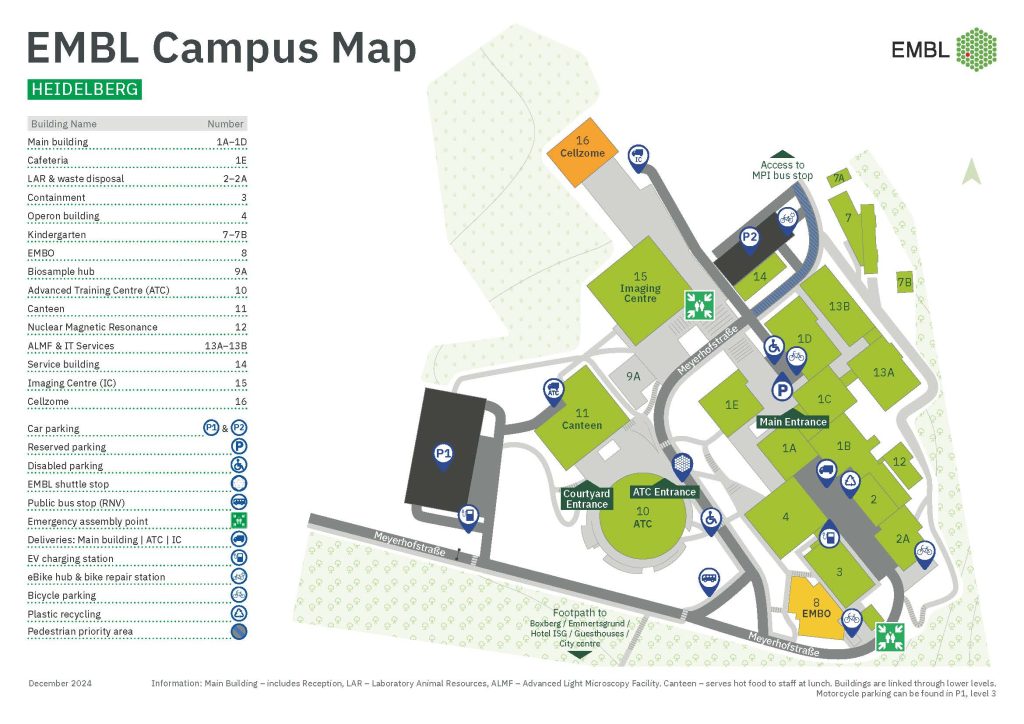
Please take a moment to read our health and safety policy.
If first aid is required
In case of fire
Beyond first aid
The Heidelberg University Hospital or ‘Universitätsklinikum‘ has a 24 hour accident and emergency facility and is at ‘Im Neuenheimer Feld 672’. It is a 8km or a 20 minute taxi ride away from EMBL. In a medical emergency, the ambulance service generally transports patients to this hospital.
Please remember to bring your own medication, if needed, to the conference. Note that the next pharmacy is a 4-minute drive from the EMBL, but for many medications you will be required to see a doctor to get a prescription.
Ensure in advance that your medical insurance will cover you during your visit in the event that you do need to see a doctor while in Heidelberg.
The EMBL course and conference office team are able to advise you on where to turn for emergency or non-emergency medical treatment in Heidelberg and can assist you in making appointments and / or arranging transport to get to the pharmacy or a doctor of your choice if necessary. Please note, we are not however permitted to personally accompany you off-campus.
A variety of activities in Heidelberg can be found on the website of Heidelberg Marketing.
Access to the event platform is given to all on-site and virtual participants.
You can use the event platform to:
More information about the platform will be shared ahead of the conference.
Additional information can be found in our Code of Conduct.
The programme is planned based on the Europe/Berlin time zone, unless otherwise stated. Please take your time zone into consideration when planning your attendance.
Please find additional information including FAQs, terms and conditions, and travelling to EMBL on our Information for participants page.
Event supporter
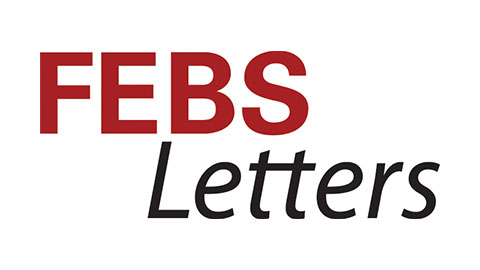
Media partners
Advanced Biology, a Wiley journal
Ageing and Cancer Research & Treatment(ACRT), a Science Exploration Press journal
Biology of Sex Differences, a Springer Nature journal
Biology Open, a The Company of Biologists journal
Cancer Drug Resistance, an OAE Publishing Inc. journal
Disease Models & Mechanisms, a The Company of Biologists journal
EMBO Reports, an EMBO Press journal
Experimental and Molecular Pathology, an Elsevier journal
FEBS Letters, a FEBS Press journal
Geromedicine, a Science Exploration Press journal
International Union of Biochemistry and Molecular Biology
Life Sciences, an Elsevier journal
Medinformatics, a Bon View Publishing journal
Open Biology, a Royal Society journal
Sponsorship opportunities
We offer a variety of event sponsoring possibilities, with the flexibility to select a set sponsorship package or combine individual sponsorship options to suit your event budget. Discounts are available for companies sponsoring multiple events at EMBL Heidelberg. View other conferences, or contact sponsorship@embl.org for further information on sponsoring possibilities.
If you are interested in becoming a media partner of this event, please visit our media partnerships webpage.
EMBL advises sponsors to beware of fraudulent schemes falsely offering sponsorship opportunities. All legitimate communication about sponsorship for EMBL conferences, symposia, and courses comes directly from EMBL via official EMBL email accounts. EMBL does not use third parties for sponsorship acquisition.
– EMBL does not sell attendee lists.
– EMBL will never ask for credit card details or direct payments.
– All payments are processed by invoice only.
If you receive a suspicious message claiming to be from or on behalf of EMBL, please report it to sponsorship@embl.org.
Want to let others know you’re attending this event? Take a look at our shareable media and feel free to use them in your social media channels or presentations.

Date: 21 - 24 Apr 2026
Location: EMBL Heidelberg and Virtual
Venue: EMBL Advanced Training Centre
Deadline(s):
Abstract submission: Closed
Registration (On-site): 10 Mar 2026
Registration (Virtual): 14 Apr 2026
Organisers:
Contact: Adéla Graf